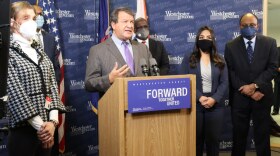Poughkeepsie officials have been gathering public feedback on the city’s draft report on police reforms. The report is in response to Governor Andrew Cuomo’s New York state Police Reform and Reinvention Collaborative, and is due by April 1st.
Dozens of speakers gave their thoughts on the plan while Police Chief Tom Pape, Captain Richard Wilson and Common Council member Yvonne Flowers, who co-chairs the Procedural Justice Committee, listened. Mayor Rob Rolison also listened.
“The Procedural Justice Committee, which was formed in 2019, was able to change its focus for the governor’s executive order,” Rolison says.
He says the conversation about policing is continuous.
“Those conversations are important to policing our community the way the community wants it to be policed,” says Rolison.
Many of those who commented on the plan are with ENJAN, or the End the Jim Crow Action Network, including Poughkeepsie resident Isis Benitez. She hopes Rolison is sincere about the conversations continuing. And she advocates for accountability throughout the plan and the definition of stakeholder.
“I want, I want everyone to understand that we need diversity in the ranks and that Poughkeepsie is predominantly people of color, and we need people who are fighting for us to look like us. If not, then no one’s going to call the police,” Benitez says. “I certainly don’t when I’m in a scuffle or anything like that. I’m horrified to, as a woman of color, I am horrified to call the City of Poughkeepsie Police Department when something happens.”
Benitez also commented on the platform that was used for the hearing.
“I hope that with these changes we’ll use a more well-known platform called Zoom, as opposed to GoToWebinar,” says Benitez.
Several other speakers also said that the February 10 meeting on the platform used was difficult to navigate, a difficulty that may have prevented others from speaking. Jeff Aman offered comments.
“In terms of the policy directives that are in there, I, I really like the vast majority of what’s there,” Aman says. “I think it’s moving in the right direction.”
“I like what I read there about the diversity in the ranks. I think that’s, the shift to lowering the education bar is, is, and paying to help with the education is a great move,” Aman says.
Aman commended the role of environmental design in public safety.
“I love that concept. The whole notion of beautification and safe passage and things like that, and I’d just like to toss out the idea that public art and the lighting and things like that can really help lift the environment to give it a more safe appearance,” says Aman. “And I think we need to do more of that on Main Street.”
Nilda Hoffman is chief of campus safety security at Dutchess Community College in Poughkeepsie, but lives elsewhere. With 30 years of experience in law enforcement, she commended the work on the police reform report. She offered a recommendation.
“Is there data that’s going to be tracked?” asks Hoffman. “Some of, many of the programs here, especially community programs for the young people, how do we track to see and determine how effective these programs are?”
Aman also wants to see metrics. Hoffman suggested that the police department’s website be more transparent and contain more information. Shannon Wong is chapter director for the New York Civil Liberties Union in the Hudson Valley.
“I’d like to start by appreciating your work on having a civilian-led response team to those who are struggling with mental and behavioral health issues, and your ongoing willingness to work on a Civilian Review Board,” says Wong.
She commented on the use-of-force policy.
“I’m pleased to see a duty to intervene statement in our police,” Wong says. “I would encourage it to be explicit that the officer has an obligation to intervene even if the offending officer is their superior, and to point out there will be disciplinary action taken for those who don’t intervene.”
The public meeting heard a variety of input, from resident Brian Robinson’s criticism about a lack of structural change…
“What you outlined in the document is a bunch of check boxes devoid of any measurable effect, something known in civil rights law as cosmetic compliance,” Robinson says.
… to 30-year city resident Jacqueline Emslie’s praise of the report.
And this report is very much a collaborative, diverse effort and is to be commended,” says Emslie. “This report should be accepted as presented, and no one should find fault with this since all stakeholders were represented and had equal opportunity to contribute as it was being formulated.”
Eli King is a member of the Mid-Hudson Valley chapter of the Democratic Socialists of America. The Poughkeepsie resident focused on the report’s description of a Civilian Review Board.
“Any Civilian Review Board passed by the city should have the power to impose disciplinary measures,” King says. “We don’t need a formal structure to make recommendations to Chief Pape and hope that he listens.”
Poughkeepsie resident Matthew Carroll:
“Yeah, you might want to have meetings on Zoom from now on,” says Carroll. “It seems like more people are familiar with that.”
He continued:
“And the Civilian Review Board should also have more civilians on it, like not so many police officials and public… like there’s no public defenders, that needs to be on there, like something like that, more diverse,” Carroll says.
ENJAN member and Poughkeepsie resident Laura Foreman adds improvements she’d like to see to the civilian complaint form, including clarity about what to expect once the form is submitted.
“To protect against retaliation, the form should allow anonymous complaints,” Foreman says. “It should also remove requirements to specify gender and birth date.”
The report will be forwarded to the Common Council for consideration. Governor Cuomo’s mandate, known as Executive Order 203, requires local police agencies to modernize their strategies and programs based on community input. Plans must be submitted to the state by April 1 or municipalities risk losing state funding.








